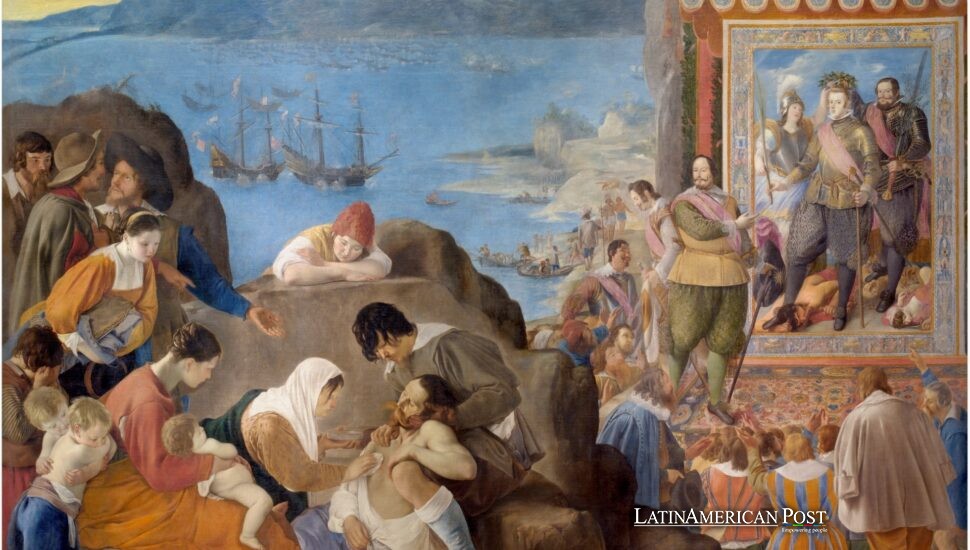Brazil Celebrates Four Centuries of Bahia’s Recaptured Legacy

This year marks the 400th anniversary of Salvador de Bahia’s reclaiming. Historians are revisiting this significant event, which redefined early colonial politics in the Americas. In 1625, Spanish and Portuguese armies drove out Dutch invaders, creating a new group consciousness and starting a conflict that spread through Brazil.
Setting the Stage: Europe’s Conflicts Land in the Tropics
Around 1620 Europe was unstable. European nations engaged in the Thirty Years’ War. They competed for power in Europe plus in other places. Amid that turbulence, the Dutch West India Company widened its Atlantic ambitions to undermine the Iberian crown’s monopoly on the lucrative sugar and spice trades. The Netherlands—locked in a protracted struggle with Habsburg Spain—saw a chance to strike at the Portuguese dominions in the New World.
In that era, Portugal had fallen under the Spanish branch of the Habsburg monarchy through the Iberian Union, a complicated arrangement that wove together the destinies of Spanish and Portuguese possessions worldwide. Yet beneath this formal union lay a simmering discontent: Portuguese nobles resented foreign rule, while Castilian authorities doubted the loyalty and competence of their “Iberian brethren.” When Dutch forces sailed into the tropical waters of Bahia in 1624, these undercurrents of rivalry would soon bubble to the surface.
Salvador, the capital of the Captaincy of Bahia, had been a prominent Portuguese foothold in Brazil for nearly a century, anchoring the region’s sugar economy. The city overlooked a magnificent bay—the Baía de Todos os Santos—offering strategic maritime control. Its capture would mean the seizure of local wealth and a stinging blow to Habsburg prestige. For the Dutch, the plan promised commercial spoils and the symbolic punch of breaching the Catholic monarch’s so-called “exclusivist” empire.
What followed was a brief but dramatic shift in power. Lacking sufficient fortifications or coherent defense, Salvador fell surprisingly quickly. Although the Dutch arrival initially sparked panic among Luso-Brazilian residents, it also set a fierce wave of loyalty to the monarchy in motion. Portuguese forces in Brazil and Lisbon pleaded with King Philip to mount a swift counteroffensive.
Salvador de Bahia: Invasion, Loss, and Redeeming Victory
The city’s capture shattered illusions of Iberian impregnability. Though more minor skirmishes had occurred elsewhere, never before had a major Brazilian port been taken so swiftly by foreign Protestant invaders. Local inhabitants and clergy scrambled to regroup on the outskirts at places like Rio Vermelho, sending desperate messages to Lisbon. As chronicles of the day recount, some accused local officials of cowardice or treachery for readily abandoning the capital. Others pointed to a lack of royal attention: King Philip and his ministers were too distracted by Europe’s swirling conflict to fortify this key Atlantic outpost.
Yet the monarchy responded with a massive fleet, uniting ships and soldiers from Portugal, Castile, Naples, and other Habsburg territories under the overall command of Spanish noble D. Fadrique de Toledo. Meanwhile, a parallel fleet under Portuguese leadership prepared hastily in Lisbon. Thousands of men set sail, hoping to restore Catholic rule in a city they believed essential for controlling Brazil’s sugar wealth.
This grand expedition took time to organize—the complexities of multi-kingdom cooperation slowed efforts. The Portuguese convoy waited impatiently off Cape Verde for Castilian ships, prompting complaints about “unequal diligence.” At last, united forces arrived off the coast of Salvador in early 1625. From there, it was a methodical, albeit tense, process of ousting the Dutch. Under relentless siege and short on supplies, the invaders succumbed on April 30, 1625.
The actual retaking of Salvador and subsequent scenes of victory rapidly became complicated. After freedom from Dutch governance, Luso-Brazilian inhabitants anticipated celebrations for the Portuguese military. However, Castilian leaders received preference during the entry parade into the city. Reports of plundering done by Spanish troops came to light. This stirred anger among the Portuguese. They viewed Bahia as their territory. The moment could have confirmed Catholic union. It showed a major division inside the monarchy.
Spanish and Portuguese Rivalries Unfold in Chronicles
A dispute with publications started. Writers from Portugal, Castile, and the Netherlands quickly released accounts. They shaped Europe’s view of the Salvador recapture. Each piece sought to sway the final description of events, feature a few achievements, and move accountability for errors.
Some Spanish histories emphasized the heroic leadership of Castilian generals, downplaying Portuguese contributions. Others, including Portuguese Jesuit Bartolomeu Guerreiro, refuted those claims, detailing how Portuguese vassals financed and manned much of the fleet. While acknowledging the combined operation, he insisted that Portuguese nobility and money carry the real burden.
A separate bone of contention centered on how the city was treated once the Dutch surrendered. Portuguese sources portrayed the Spanish soldiers as overreaching victors who confiscated goods sold back salvaged property to the local. Spanish authors, meanwhile, retorted that the Portuguese had proved unreliable earlier, leaving Salvador poorly defended. As for the Dutch accounts, they portrayed local inhabitants as sometimes sympathetic to the invaders or at least disillusioned with Iberian rule.
The literary debate was not minor. Each faction sought political gains in the monarchy’s large territories through narrative control. For a long time, the Portuguese believed Madrid had overlooked its holdings abroad. The regaining of Salvador provided a good opening for them to declare their courage. But the Spanish tried to state that the Habsburg family, not the Portuguese nobles who opposed them, had won. This conflict showed underlying doubts. Such doubts put the monarchy’s future in danger.
Political Undertones: Discontent and National Ambition
The short-lived concord collapsed. Internal resentments did not lessen, even after the Dutch fight reached its clear end. Several Portuguese nobles did not appreciate paying significant taxes to support a monarchy located in Madrid. They also complained about the minimal credit given to their soldiers in official bulletins.
The seeds of dissatisfaction were likely to be sown well before 1625. Past failures—like neglected fortifications in Angola or the retention of Mozambique—stirred anxieties that the Spanish crown valued Portuguese territories only as economic assets. Clerics such as Bartolomeu Guerreiro, who had scolded the monarchy from the pulpit for ignoring Portuguese conquests, found renewed ammunition in the events at Salvador.
Spain’s official chronicler, Tomás Tamayo de Vargas, produced a grand narrative of the recapture, but critics accused him of glossing over Portuguese contributions. Portuguese authors were implicitly at odds with any notion that Castilian troops had saved the day. Even so, they stopped short of calling for independence. Instead, they couched their frustration in the language of loyalty, praising King Philip but lamenting that lesser Spanish officers or bureaucrats slighted the Portuguese cause.
Though the monarchy had won a significant confrontation with the Dutch, fresh tension emerged from the pen of each chronicler. Over the next decade, these unresolved disputes simmered. When Portuguese aristocrats eventually declared independence in 1640, some historians saw the seeds of that rebellion in the arguments unleashed by the controversies surrounding Salvador’s retaking.
Rewritings and the Seeds of an Independent Future
Once the smoke cleared, celebrations erupted across the Spanish-Portuguese realms. Church bells rang out in Lisbon and Madrid while sermons proclaimed divine providence in awarding such a splendid triumph. In the Netherlands, the defeat in Brazil invited introspection about whether more robust support was needed for the West India Company’s American ventures. Meanwhile, the Luso-Brazilians of Bahia tried to mend their battered capital.
Celebrations and ceremonies hid deeper shifts in Brazil’s development. The town’s comeback showed Salvador’s worth to strategy. The port handled not just the local sugar business; it was a main point in the South Atlantic. This alteration had links to opinions held by the Spanish and Portuguese governments concerning Brazil. The territory needed better defense besides funding to avoid attacks later.
Through the 1630s, the government provided money for new fortresses through Bahian waters and spent more on a steady colonial government. Brazilian farmers used the chance to grow sugar farms. These farms had connections to Atlantic business, giving Portuguese money and resources to Spanish goals. A more united Brazilian identity came from this. The people kept the Portuguese language and history but still had a tense connection to the government in Madrid.
In effect, the “Annus mirabilis,” as one Spanish writer lauded in 1625, showcased how a crisis could spark transformation. The confrontation with the Dutch forced robust cooperation between the Luso-Brazilian population and the monarchy’s agents. At the same time, it revealed the persistent cracks between Portuguese vassals and Castilian officials. Those cracks would not truly mend. By 1640, an emboldened Portuguese aristocracy regained independence, establishing the House of Bragança on the throne.
By then, Brazil had grown into a more self-contained colossus, forging internal networks that would eventually catapult it into the following centuries as the largest colony in the Americas. The memory of recapturing Salvador from the Dutch mutated into a foundational narrative: the day Portuguese “heroes” overcame adversity to preserve their prized territory. Even after independence from Spain, that notion continued to anchor Brazilian lore well into its trajectory toward autonomy and empire in the 19th century.
After four hundred years, historians view the retaking of Salvador as an important event in the formation of Brazil’s colonial character. It shows the impact of unstable relationships within the Habsburg Empire on the future of Portuguese America. The battles in Salvador—both on the field and in subsequent literary quarrels—reinforced the distinct sense among Portuguese in Brazil that they were more than mere cogs in a sprawling monarchy. Indeed, they had proven capable of defending themselves, albeit with a patchwork of Iberian assistance, when threatened by a powerful foe.
In that sense, the recapture of Bahia reminds present-day observers that conflicts and conquests produce immediate winners and losers and sweeping changes in allegiances and self-perception. The Spanish and Portuguese coalition displayed fleeting unity that soon gave way to rancor, shaping the destiny of an entire region. Officially, the city remained under a single crown, but local hearts carried the seeds of what might become a new chapter of separate ambitions and eventual independence.
The 400 years that have passed underscore the layers of reinvention in the aftermath of the Bahian victory. The recapture demonstrated Spanish imperial power—concurrently, it showed the sustained power of Portugal. The monarchy’s triumph also bolstered its considerable power. In addition, that triumph sparked Portuguese pride, which then created demands for equal recognition. The debates that blended moral, political, and religious reasoning helped establish a clearer Portuguese identity while unexpectedly strengthening a unified Brazilian identity.
Also Read: Mexico’s Drought Sparks Exodus Threat for Desperate Ranchers
Commemorating this event today enables scholars and communities to uncover new perspectives about the emergence of rivalries from historical grand alliances. Salvador’s reconquest shows Brazil’s formation displayed both accord plus discord. A country developed when global society shifted from Catholic cooperation to a sense of national self. While the city’s battered walls have long been restored, the lessons of 1625 ring clear: to truly reimagine an empire, one must come to terms with each partner’s place in the grand tapestry of colonial power.





